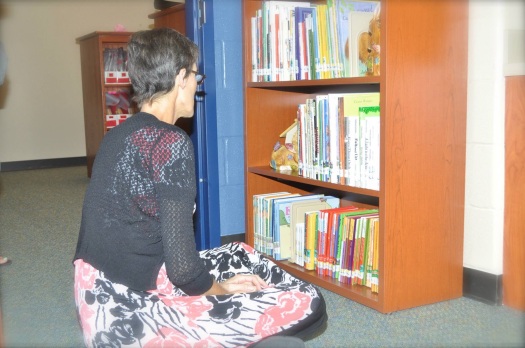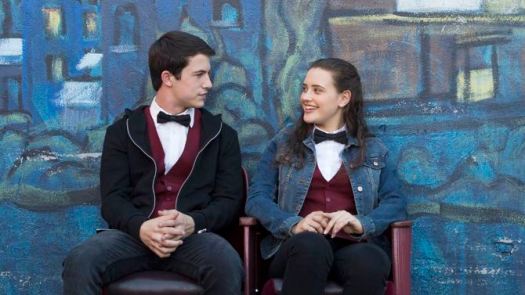
Well, kids, here we are.
This is the year.
If there is one thing you know about me, it’s that I try to be optimistic in all things. But it’s time you were aware of something: there was a day, 12.5 years ago, when postpartum hormones were still pumping through my veins. I touched your beautiful, soft, apple-shaped cheeks and I wept. And then I wept some more.
The tears would not stop. And the reason was because it hit me that one day I would have both a seventh and eighth grader in my house. And the idea of what you – and we all – might go through during that potentially crazy, heart-wrenching, unpredictable season scared me to death.
That day has now come.
There are many things that comfort me in this inevitably terrifying time. First, despite a few concerns here and there, I actually still really, really like you. Don’t get me wrong. I knew I would always, always love you. But the liking you – really enjoying you and wanting to be around you? It’s still there, too. And in fact, it’s stronger than ever. Thank you for that.
You two are some stunningly smart, quirky, kind people. And you really do want, day to day, to make good choices. I’m not as terrified today as I was when you were babies. But I have to be honest, I’m still pretty darned nervous about this year. There’s just so much potential for heartache. And disappointment. And hurt.
I wish I could safeguard you against the pain that will inevitably come at some point this year. (And the pain that came last year, too, come to think of it.) That’s impossible, but I wanted to at least share a few tips/ideas for you as you enter this season.
Humor your mom, will you? (And maybe someone else out there will find comfort in these, too.)
Don’t Worry About Being Popular
I know I tell you this one all the time. But I just want to emphasize it to you once more. I could care less if you have one friend or 1 million. Popularity is a crock, because the thing about popularity is that it’s fleeting.
I had a co-worker years ago who always said, “Everyone loves a winner until they win too much.” There’s a truth in that. People love to build you up and then tear you right back down. It makes them feel – sadly – more important.
What is popular one day will be unpopular the next. And the ways that you have to contort yourself to fit the constantly changing standards of popularity just plain aren’t worth the damage that is done to your soul. Make decisions that you can live with and feel good about. That is all that matters.
Do Your Best, But Don’t Worry Too Much about Recognition
Maybe this one will surprise you. I know Dad and I have a wide streak of competitiveness in us. We like to win, and we like to see you win, too. (You may have noticed this from years of hearing us scream like maniacs for you in soccer/baseball/football/basketball/volleyball/swimming.) But the thing about prizes and recognitions is that often, the focus is on doing better than others. And in life, there will be times that you will be the smartest or the most athletic or the most successful in the room. But there will be many more times that you won’t be the very best around. Someone is usually worse, and someone is usually better.
That’s how life works. (Besides, if you are always the smartest or most capable person in the room, you are probably in the wrong room, because how in the world will you ever learn anything?)
Another problem with setting your sights on being recognized by others is that sometimes the deck is stacked against you. It’s no secret to you that some kids and families get special treatment – maybe because of whom their parents are, or what they have, or the pressure they have applied behind the scenes to get special treatment. Other times, you might be overlooked because, while some might find you to be lovely kids, you inevitably won’t be everyone’s cup of tea. You aren’t for everyone, and everyone isn’t for you. Sometimes this includes grownups. And that’s ok, as long as you are respectful of the authority they have been given over you.
You can’t control many of the factors that go into being picked for awards or recognitions. You will win some and you will definitely lose some, too.
So, instead of trying to beat others, try to be your very best. Think about how you want to finish this year. What do you want to end the year knowing that you have done? What do you want to have learned? How do you want to have behaved? What experiences would you like to have had? Focus on those things. That is what you can control and that is what will serve you best in life and in learning.
The Most Interesting Adults Often Had the Most Awkward Junior High Years
The people I like the most seem to have one thing in common: junior high was hell on earth for them. They were awkward. Their skin was weird. Their hair did strange things. They stumbled and stammered. Their teeth didn’t quite seem to fit their faces for a season. They were sensitive. Maybe they cried more than others thought normal. Maybe they snorted when they laughed. Or had really, really runny noses. Maybe they liked cartoons or Star Wars or Dungeons and Dragons a little more than other people thought was OK.
And in all that weirdness and awkwardness, they developed actual personalities. They became some of the funniest and most insightful people on the planet. Maybe their experiences gave them empathy. Maybe they learned to laugh at themselves. Maybe all that time alone in the cafeteria gave them the time they needed to begin thinking the interesting thoughts that make them who they are today. During the hardest time, remember that this season probably isn’t the best season in your life. But it is preparing you for something amazing.
No One Really Has It All Together
You know that girl that seems to have it all figured out? The boy that has the perfect hair that everyone on campus seems to adore? I promise you they feel as ridiculous as you do. They, too, aren’t fully comfortable in their skin. That seems to be one of the biggest themes of these years – just learning to be comfortable within yourself. And it takes everyone a little time and a whole lot of work.
Recently, I talked to some of my fringe friends from junior high. They were the ones I once envied, because I truly believed that if I could just be them, I would never again feel the pain of being awkward and unwanted. I asked these people how they remembered junior high – what it was like to be the people who had it all figured out.
They had no idea what I was talking about! “Those were the worst years of my life!” one Perfect One said. “I am so embarrassed by how I acted and how I behaved then.” “I hated myself every day.” “I felt so unloved.”
I’ve never seen an actual study on this, but I really do believe that your hormones conspire to trick your brain in junior high. They convince you that you are uglier, more clueless and more awkward than anyone else in the entire city.
And yet, the thing is, that can’t possibly be true, because everyone is feeling the same thing at the same time. You are totally fine. And even if you are having a bad hair or skin day, know that it really doesn’t matter as much as you think. No one is thinking about or watching you too terribly much. They are all too busy worrying about themselves. Seriously.
Don’t Get Too Focused on Yourselves
You’ve been taught to serve others and to do it often. You already know it’s important to give water and clothes and food to people who are homeless. You encourage kids younger than you in your volunteer work at the library and the hospital, and spend time with seniors who are afraid of being forgotten. We’ve talked a lot about doing that because it’s good and it’s right. Much has been given to you, and so much is expected.
You need to know now that there is another reason to do good: serving others can absolutely, positively save your life. Taking our minds off our own challenges and struggles and recognizing how we can make the world a little better is one of the things most worth doing in this world. And as long as we can make a difference – to someone, anyone – we know that we have a reason to be here.
Continue to Value and Cling to the Adults that Love You
One of the cruelest and most confusing aspects of these years is that during a time when you could use a kind and supportive word more than ever, you also are feeling an urgent need to pull away from the adults in your life.
You might feel convinced that your parents, your teachers, your aunts and uncles, and your youth group leaders could never possibly understand you. You feel like if you don’t pull away from them during these years, you will never grow, and you will still be living at home when you are 40. But that’s not really true. You need to begin forming your own ideas – that much is true. You need to learn to think and do for yourself, and you need to develop the courage and the moral muscle to do the right thing, even when you know you could probably get away with the wrong choice.
At the same time, the adults in your life really have been where you are now. They didn’t have the same technology, or fashion sense, or taste in music. But human beings have been doing this whole maturing into adulthood thing for a while now. There probably are some things you could learn from the people who have already lived it.
(And besides, those people love you. They believe in you. Honor that. Because as you get older, you will realize that it’s one of the most amazing, inspiring gifts you have ever been given.)
Look for the Other Kids Who Drift Between Groups
There is something stunningly refreshing about people who think for themselves. This is true at any age, but the very best people in the world learn how to do this at a young age. This is why some of the most awesome people you could ever meet can be found on the fringes of social groups. They are the people who resist groupthink and choose their own interests and ideas. Often, they are the kids who are jocks but also really love science. They are the nerds who also can write their own music. The actors that also love baseball. The people who already think for themselves and march to their own beat are your people. It’s both how you’ve been taught to live and how you were created. Find your people. (Yes, even, if there are only two of them. Because two really is enough, particularly since we already told you the popularity contest isn’t one worth entering.)
Really, There is Just This One Goal for Junior High
We hope you earn good grades – or at least the best ones you can. We want you to work hard in whatever you choose to do – whether it’s school or sports or music. We want you to remember to honor the name that you have been given and the family you represent. We hope that you smile a lot this year. And laugh some – at yourself and also with others.
But more than anything, our goal for you in junior high is simply this: be a good person. Speak up for the underdog. Be kind to everyone – including yourself.
The thing I am most proud of in my life at this point is that I have a 12-year-old and a 13-year-old who don’t seem to be jerks. You try to be kind – to each other, to me, and to the people you encounter at school, at church, in sports, and even in the places that we go to try to serve.
To me, the worst thing about seventh and eighth grades was that it felt like every day, the culture of my school community tried to pound that kindness out of me. I felt like I had to learn to be hard. Indifferent Unfeeling. A bit of a smart a$$.
Don’t let this year make you hard. Be brave enough to be kind. And decent. Don’t put down the people who don’t seem to value even themselves. Be helpful – to your peers and to teachers and to younger kids. Recognize how hard this life is for all of us. And be of use, any way you can, to make it just a little bit better.
Thank you for being the people that you are. Let’s do this. Together.









